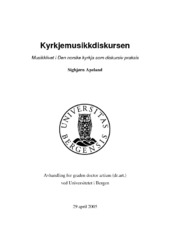Kyrkjemusikkdiskursen. Musikklivet i Den norske kyrkja som diskursiv praksis
Doctoral thesis
Permanent lenke
https://hdl.handle.net/1956/656Utgivelsesdato
2005-04-29Metadata
Vis full innførselSamlinger
Sammendrag
The Church Music Discourse. Musical Life in the Church of Norway as Cultural Practice. Church music as contemporary culture Debates about contemporary musical life in the Church of Norway are characterized by tensions between ”tradition” and ”renewal”, ”entertainment” and ”contemplation” and between ”the popular” and ”the elite”. There is common agreement that music is valuable and necessary in the church, but at the same time, there are contradictory and competing notions about what kind of music (and liturgy) is appropriate, and various actors (individuals, groups and institutions) are struggling over the premises for discussion. ”Diversity” has become a highly valued concept both within the church and within the cultural bureaucracy. This implies that traditional musical and liturgical forms have lost their former privileged position and now must compete for attention at the same level as actors of contradictory interests. The dissertation includes a mapping of musical practice within the Church of Norway, the relation between church music and the general cultural field, and its place within musical and theological educational institutions. Further, the following examples from the debate are presented and analyzed: notions about ”youth”, the position of ”modern” music within the church, discussions about church musicians` theological status, and various aestethic and theological arguments for the use of music in the church. All these issues are interpreted in relation to sociologist Pierre Bourdieu´s concept of ”social fields” and the the concept of ”discourse” as it is put by otherwise different philosophers such as Michel Foucault and Paul Ricoeur. Music is thus analysed as ”cultural practice”, instead of being reified as ”work of art”, ”sound object” or ”religious medium”. Rather, music is being interpreted as interhuman action in a social context. Talk and Writing about music thus becomes important sources for the interpretation of how the making of musical meaning happens. The dissertation is based on the following sources: Different kinds of public statements about liturgy and church music, f.ex. as they appear in books, journals, newspapers, church-laws and liturgical documents. Interviews with several actors within the church (basically priests and organists) have been carried out, and the researcher´s own experiences as a performing musician (”participatory observation”) have also been an important source.
Utgiver
The University of BergenOpphavsrett
All rights reservedSigbjørn Apeland
